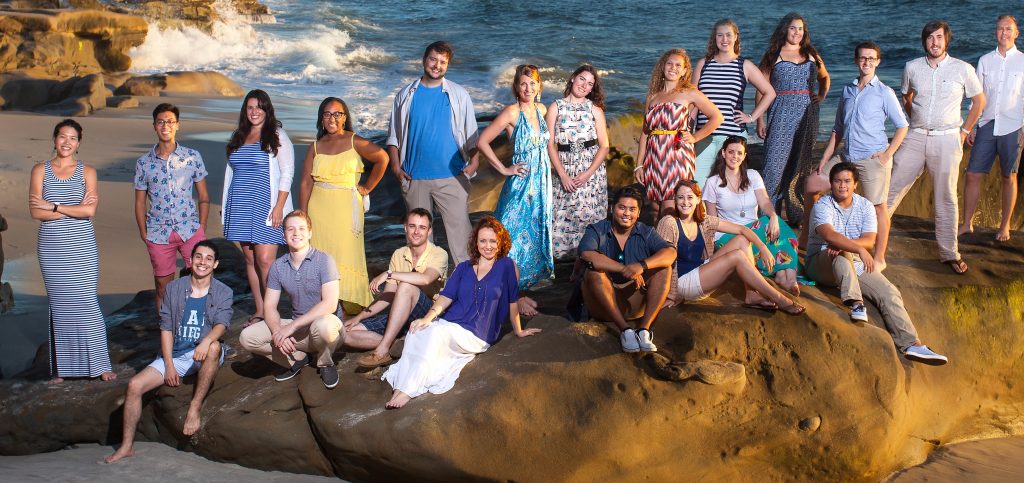Sacra/Profana: Luminous Singing for the Lives and Strength of Women
The San Diego choral scene brightened significantly some 10 years ago when Krishan Oberoi launched his vocal ensemble Sacra/Profana. I vividly recall the thrill of hearing David Lang’s Little Match Girl Passion performed under his direction at the University of San Diego.
In terms of programming, this excellent choir has followed various paths since those exciting early days: some have challenged their audiences with cutting-edge new music, and a few have come dangerously close to pandering.
I am relieved to report that last weekend’s Sacra/Profana program “Gender: X” revived the adventure and challenge of Oberoi’s early days and raised the bar several notches. The achievement of this concert was due, in part, to its thematic organization: works by women composers and poets, but that was only the beginning.

Singers of Sacra/Profana [photo (c.) Weston Bennett]
Allow me to hold up some of the gems among these fourteen probing, inventive compositions. Karin Rehnqvist set the text of a 17th-century Swedish Lutheran hymn “I Himmelen, I Himmelen” in gleaming, sonorous waves of sound, including a soaring high descant that four Sacra/Profana sopranos ensconced the rear gallery of Christ Lutheran Church delivered with resplendent force. Heavenly, indeed!
Libby Larsen’s “The Womanly Song of God” suggested an a cappella anthem of symphonic scope, with voices crafting wordless, polyphonic interludes as well as declaiming her vibrant text replete with vivid feminine imagery. Her concluding line captures her thesis, “I am a God of a thousand names: why cannot one of them be Woman Singing?”
Recorded live nature sounds and spoken poetry garnished Katerina Gimon’s “The Mountain to the Moon,” a prayer of longing for connection that imbued a mountain peak with human emotion. The men of the choir began Hildegard von Bingen’s luminous chant “O Ignis Spiritus” mysteriously in the church narthex, then processed up the center aisle, pushing the chant in a gentle crescendo, to join the women singing in the front of the church. Rooted in the medieval chant style of her era, the sinuous majesty of Hildegard’s single line over a soft drone had more in common with the contemporary choral music of Estonian Arvo Pärt than with any of the music since the 12th century.
Winner of Sacra/Profana’s recent composition competition, Sarah Rimkus’ “The Devil’s Tower” turned a traditional legend of Wyoming’s Kiowa people into a choral tone poem that captured with tense urgency the ferocity of the story and yet managed to rest in the transfixing mystery of its denouement. A trio of women worked Alexandra Oslavsky’s simple chant “What Happens When a Woman?” into a roaring, foot-stomping rally, forging its simple lines into a passionate battle cry.
And when it comes to rallying the complacent to the call of justice, can anyone top Bernice Johnson Reagon’s “Ella’s Song” that brought this stunning concert to its climax? Reagon, a member of the renowned Washington D.C. based “Sweet Honey in the Rock” begins with the determination of the Negro spiritual and expands it with the intoxicating harmonies and swing of glorious gospel music. Sacra/Profana infused Reagon’s compelling work with its most robust yet magnificently tuned ensemble singing. It may have been late at night, but at the conclusion of “Ella’s Song” I was ready to pick up my placard and march on the bastions of power—no questions asked!
Other impressive works on this program were Gunnar Erickson’s “Salve Regina/To the Mothers in Brazil,” another rousing processional with a political theme whose insistent litanies brought to mind Jean Berger’s classic “Brazilian Psalm,” widely sing in the mid-20th century. Soprano Katie Walders channeled the ardor of Billie Holiday—who was represented on this program with a haunting arrangement of her song “Strange Fruit”—in her mesmerizing opening solo of “Sympathy,” a telling, poignant setting by Scot Hanna Weir and Bruno Ruviar of that unforgettable Paul Lawrence Dunbar poem “I Know Why the Caged Bird Sings.”
Amrein’s direct and understated approach to directing appeared calmly centered, even in the most ebullient musical effusions. Yet she elicited from Sacra/Profana some of the most persuasive and deeply committed communication–without compromising any of its ensemble elegance– I have heard from this choir. And in this concert, the women sang with astonishing splendor. To paraphrase Holly Near, “they were singing, singing for their lives.”
Sacra/Profana presented the choral program “Gender X” on March 22, 2019 at St. David’s Episcopal Church in South Clairemont and on March 23, 2019, at Christ Lutheran Church in Pacific Beach. The March 23rd concert was attended for this review.

Ken Herman, a classically trained pianist and organist, has covered music for the San Diego Union, the Los Angeles Times’ San Diego Edition, and for sandiego.com. He has won numerous awards, including first place for Live Performance and Opera Reviews in the 2017, the 2018, and the 2019 Excellence in Journalism Awards competition held by the San Diego Press Club. A Chicago native, he came to San Diego to pursue a graduate degree and stayed.Read more…
